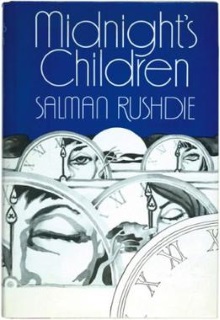
So this was an entry in What Makes This Book So Great though as Jo Walton noted, it isn’t usually regarded as a genre book. It is however world famous as the novel that launched the career of Salman Rushdie. The novel is hugely popular, especially in the UK, and won the Best of the Bookers twice. I’d argue however that while it does have ‘genre’ elements, it doesn’t read like one and shouldn’t be properly considered as science-fiction or fantasy.
This epic novel chronicles the life of Saleem Sinai, who was born at the precise moment of India’s independence. However the main character doesn’t even get born until a good third of the way into the novel as it takes its time tracing his origins from his grandparents in Kashmir. Feted by the authorities for his auspicious birth, great things are expected of Saleem, yet he grows up in Bombay as an ordinary boy to a wealthy family. A shocking incident however causes him to develop telepathy with a range that apparently extends across the entirety of India. He further learns that there are a great number of other children like this with varying powers. Saleem uses his telepathy to mentally connect them all together, forming what he calls the Midnight Children’s Conference and tries to convince them that there is a higher purpose in them having these powers. However he has trouble uniting the children and is opposed by Shiva who is his counterpart with immense physical prowess. At the same time, this is also the story of India and its own offspring Pakistan and Bangladesh as Saleem’s life is turned this way and that as a result of the tumultuous events.
It’s worth noting that the children do legitimately have superpowers, so it’s not some kind of metaphor as could be the case in a mainstream novel. One of Saleem’s closest allies is Parvati, a fellow child of midnight who is a literal witch. At one point, Parvati hides Saleem in a basket and makes his weight literally disappear in order to smuggle him back into India. Unfortunately it still doesn’t read as a genre novel because while having powers makes a difference in the lives of the children, the story always contrives it such that the powers never have larger consequences to society and relatively few characters know of them. In that sense, the superpowers are narrative fluff which add mystique and wonder to the story but don’t matter in the greater scheme of things. Saleem even manages to permanently lose his powers at one point. This means that while it’s fun to think of this as a novel about Indian superheroes, that really isn’t the case at all.
Instead this is really the story of India immediately before and then after its independence with a huge cast of characters to capture all of the diversity and richness of such a large country. Not all of the historical references are real, for example Mian Abdullah, a popular Muslim political figure, appears to be fictional. But as in similar works of magical realism, there’s a feeling that it’s more real than real, the better to capture all of the subtle currents and complexities of a story that is far too large to be told otherwise. To get the most out of this story I would say that you do have to know India and even to love it. But even to someone like me who knows next to nothing about the country, the breadth and depth of the novel is mind-blowing. It’s like going on a grand, fantastically wonderful and magical tour of the country. Rushdie’s prose notably engages all of the senses such as you can hear the wailings of the women, smell the unwashed masses on the street, taste the ‘grasshopper green’ chutney that Saleem so prizes. This truly is a novel that is meant to be read slowly and savored.
At the same time, this also serves as a ridiculously complete showcase of all kinds of literary techniques. As Saleem writes out the story of his life, it is read by Padma, a woman who cares for him later in his life. In doing so, she stands in for the audience, asking the same questions and making the same criticisms as the reader would. In order to build suspense, the storyteller goes to great lengths to keep secrets from the reader such as exactly which of the characters in the beginning are Saleem’s parents. Of course, he also pulls the unreliable narrator trick as he readily admits, either to make it a better tale or to play to his own biases. One segment switches to a stream of consciousness prose when Saleem’s state of mind is compromised. In lesser hands so much use of these flourishes would probably feel gimmicky and annoying but Rushdie has no trouble making all of these tools work for him. It’s really a very impressive piece of writing from a technical perspective.
Still with the novel being as long as it is, you do eventually get a sense of Rushdie’s style and come to expect how he always insists on sudden twists of fate such that by the end of the novel there are no longer any surprises. I also found that I’d like the novels that I read to have a theme that is more pointed beyond that the history of India, and life itself, is full of vagaries and unexpected twists of fate. There’s no doubt that Rushdie is a masterful storyteller and like the One Thousand and One Nights, the novel itself in a certain sense about the art of storytelling. While I certainly enjoyed this diversion into mainstream literature, I think I still much prefer my science-fiction and fantasy books.
One thought on “Midnight’s Children”